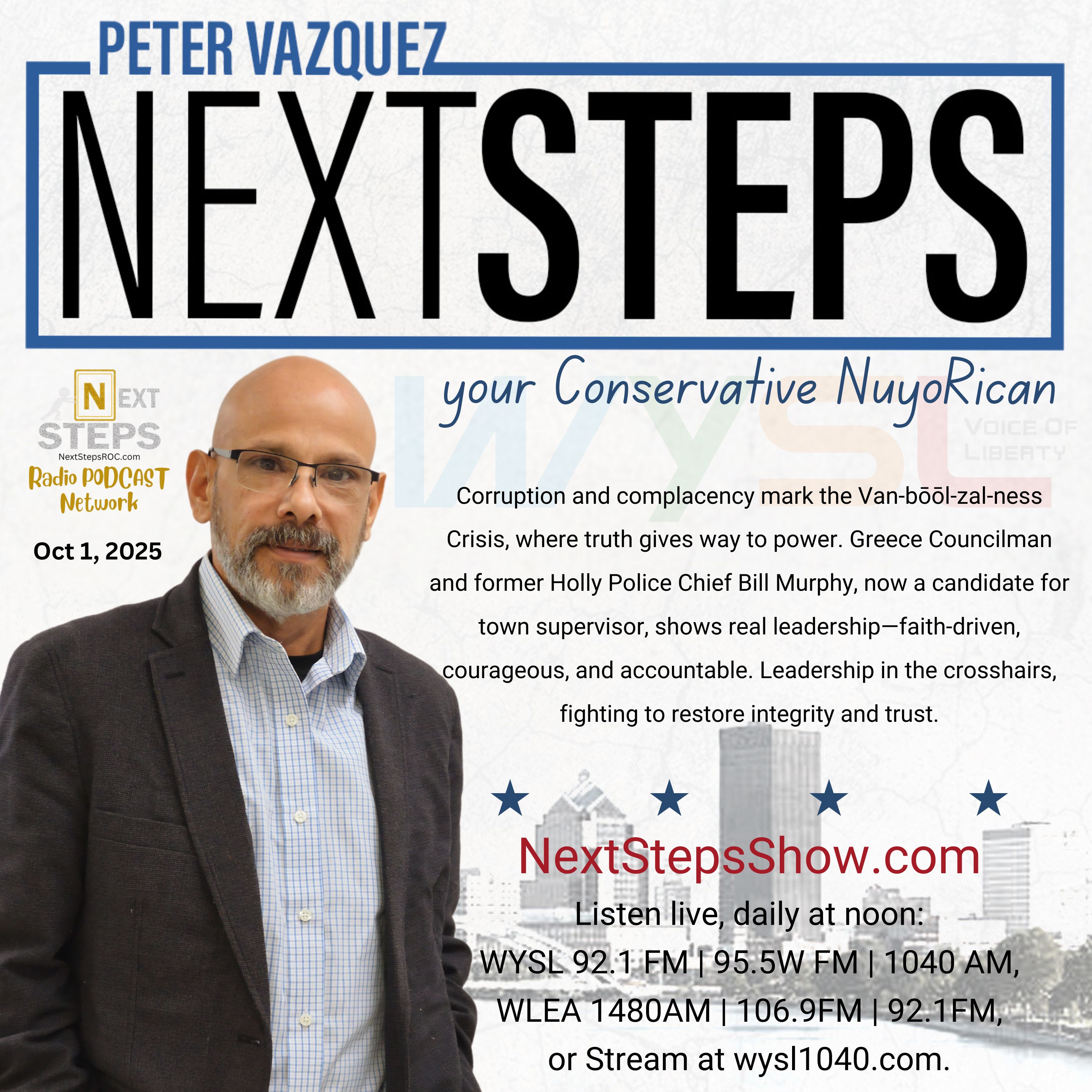
Bill Murphy and the Battle for Greece’s Future: Leadership in the Crosshairs
In Monroe County’s largest town—Greece, New York—the tension between integrity and politics has reached a breaking point. While many talk, few act. That is the territory Bill Murphy now occupies: as a Greece Councilman, former Holly Police Chief, and candidate for Greece Town Supervisor, he stands at the intersection of faith, service, and truth.
This is more than a local election. It is a test. Because when moral decay, misinformation, and complacency spread, communities lose their compass. The fight in Greece is a microcosm—proof that leadership must be tested under fire.
A Community at Odds: Population, Crime, and Identity
Greece is not a sleepy hamlet. According to the U.S. Census Bureau, its population hovers around 94,642 as of mid-2024. It is the largest town in Monroe County and second only to the City of Rochester in the region’s population density.
Yet with scale comes burden. Greece’s crime rates are well above national averages. The town sees approximately 484 violent crimes per 100,000 people—and 2,232 property crimes per 100,000—for a total crime rate of 2,715 per 100,000 residents in recent reports. Meanwhile, some local data sources suggest an overall crime incidence of 227.61 per 1,000 residents, significantly higher than national norms.
Those numbers are not abstractions. They reflect homes broken into, personal security compromised, and public trust eroded.
As Peter Vazquez framed it early in the show, leadership begins when the people’s safety and faith are on the line.
Leadership Beyond Lip Service
From the very start, Vazquez challenged the standard definitions of leadership: “Leadership is not about titles or promises,” he said. “It is about standing firm when a community’s trust is on the line.”
Bill Murphy knows that test intimately. Having served 29 years in law enforcement—culminating in his tenure as Holly Police Chief—he understands that authority is earned in the streets, not granted by formality. In the interview, he repeated several times that a community will accept direction only when it sees consistent integrity.
His approach: “This isn’t about me—it’s about the people of Greece,” he said. “We must return governance to the grassroots, not backroom deals.”
The Power of Deception: Political Smears and False Allegations
One of the most intense segments of the interview addressed a serious moment: Murphy’s name was cited by a federal magistrate in connection with a perjury referral. For many, that would spell disaster. For others, it is weaponized.
Murphy made this crystal clear: “This never occurred,” he said. “The supervisor fabricated it. I was accused without evidence, during an election year, to damage my reputation.”
He explained how the accusations were tied to suggestions of a leak in town hall. He named an attorney in response to pressure, only to see her later cleared of any involvement. There was no email, no text, no contact. The accusations were hollow.
As Vazquez pointed out, this interview was not scripted—no pre-screened questions, no friendly talking points. That transparency, he said, is itself a rebuke to a culture of backroom municipal narratives.
Public Safety: Rebuilding Order, Rebuilding Trust
Murphy’s law enforcement roots were on full display when the interview shifted to public safety. He detailed plans to reinstate the school resource officer program, which had been shut down amid political conflict.
“You cannot put a price on a child’s safety,” he insisted. “We will work with the district, the board, and the community. If budget fights block us, we’ll find other funding—grants, partnerships—but we will restore it.”
In an era when officers nationwide are under siege politically, Murphy’s vision re-centers enforcement around protection—not politics.
He also revealed enhancements to policing infrastructure: expanded license plate reader systems near high-traffic areas like the mall, greater patrol presence, and an uncompromising promise: “Mess around in Greece and you will be held accountable.”
Voices from the Street: Real People, Real Anxiety
One of the callers—Keith—cut through the political noise. He praised Murphy’s clarity and integrity, noting how few public figures today answer allegations head-on.
“Good people today have a hard time making themselves heard,” Keith said. “You seem like a man of integrity. Say it proudly—tell people who you are.”
Murphy responded with confidence: “These claims are 100 percent false. There is no merit. But yes—I will fight this to the end.”
It was more than a statement. It was defiance. The moment underscored a central thesis of the show: leadership is proven when attacks come.
Housing, Dependency, and Cultural Overreach
Perhaps no issue underscores ideological conflict more than housing policy. Murphy addressed it bluntly: Greece has existing Section 8 housing, and more may be justified—but unchecked expansion is a danger.
“The state’s push to redistribute urban issues into the suburbs under the banner of ‘affordability’ is not progress,” he warned. “It’s social engineering disguised as benevolence.”
Vazquez framed the danger in his Van-bōōl-zal-ness narrative: when ideas become tools of control, not solutions, you work the policy, not the people.
For Murphy, the solution is balance: ensure housing for seniors, veterans, and low-income families—without turning entire neighborhoods into political billboards.
Veterans: A Moral Obligation, Not a Campaign Pitch
One of the most powerful moments came when the focus turned to veterans. Murphy is not a distant advocate—he is a member of American Legion Post 468, and he knows those struggles up close.
He quoted his post-level conversations: housing is the number one priority—not health benefits, not job training, but having a stable, safe roof.
The larger data confirms it: In January 2024, the U.S. recorded 32,882 veterans experiencing homelessness, of whom 13,851 were unsheltered—a record low and an 8% drop from 2023. That’s progress. But in a system built on bureaucracy, that number still means thousands without safety.
From 2010 to 2022, veterans’ homelessness dropped more than 50%—even while the overall veteran population declined by 25%. That shows that programming can work. But only if local leadership demands it.
Murphy’s proposal: a Veterans Council, tasked with breaking red tape, interfacing with agencies, and returning dignity to men and women who served. No speeches. No surface-level programs. Solutions.
As researcher Sarah Hunter once told RAND: “The worst part of being homeless is that you stop feeling human.” This must be unacceptable in Greece.
Faith, Character, and the Van-bōōl-zal-ness Crisis
Throughout the interview, faith was not window dressing—it was anchor. Murphy said: “Faith is huge. It keeps us centered. If we are not grounded, how do you make hard decisions?”
Vazquez described Van-bōōl-zal-ness as a moral disease: swapped convictions, soft truths, culture of comfort. In that environment, courage is rare.
“I’m not here for titles or applause,” Murphy said. “I’m here for integrity. For service. For truth.”
To lead while the culture demands compromise is radical again.
Contrasts and Consequences: The Political Divide
Jeff McCann—the opponent Murphy faces—is emblematic of what Murphy calls “political opportunism.” McCann’s résumé includes multiple party shifts and high-profile endorsements. Murphy frames that as a warning sign.
“When insiders feel threatened, they weaponize process,” Murphy said. “They shift the narrative. I represent people; he represents the machine.”
Vazquez didn’t mince it: “This is not just partisan. It is moral. Which side values character, which side values expedience?”
The stakes are not policy alone—they are who we trust to defend morality in a community under siege.
Leadership in the Crosshairs
Bill Murphy’s campaign is not built on slogans. It is forged in battle. In the debates, the defamation, the pressure, he remains centered on truth, faith, and accountability.
To live where corruption whispers, to grow up where rumors follow, and to stand—publicly—as a beacon of integrity is to take fire for the sake of truth.
As the show closed, Vazquez delivered the challenge:
“Leadership isn’t about titles. It’s about standing firm when your community’s trust is on the line.”
Murphy replied:
“This is about integrity, family, and faith. Lead with those, and the rest follows.”
For Greece, this is more than a campaign. It is a crossroads. If the citizens choose courage, character, and conviction again, what is broken may yet be rebuilt.
Because leadership tested by fire is leadership the people can trust—not commands from a comfort zone, but truth endured under pressure.



